Young people "can't afford to work for free" says Intern magazine founder
News: the founder of a new magazine celebrating the work of interns in the creative industry has spoken of the dangers of creating a culture on unpaid labour (+ interview + slideshow).
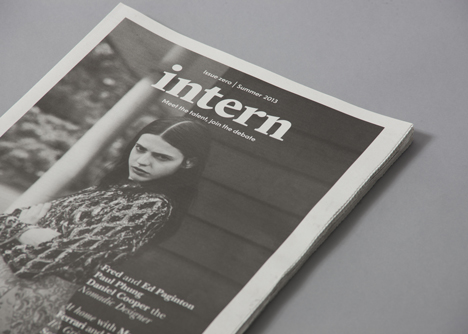
"We would welcome a move away from unpaid positions," said Alec Dudson, who is trying to raise money on Kickstarter to launch Intern magazine in the UK. "The danger across all industries is that a culture is fostered whereby young talent thinks nothing of unpaid work and puts up with arrangements that are far from beneficial," says Dudson.
However, Dudson said that unpaid positions can sometimes be beneficial to young people. "Unpaid positions can, in circumstances that satisfy the intern's needs, be useful experiences for those trying to break into the industry," he said, responding to D&AD chairman Dick Powell's recent speech advising graduates to "work for nothing".
Yesterday Powell clarified his remarks, saying unpaid work is not "acceptable on any level".
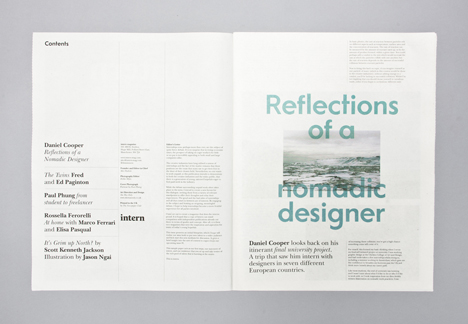
Intern magazine aims to showcase work from talented creatives currently interning in the creative industry, and raise debate on the culture of internships. Manchester-based Dudson told Dezeen: "Our intention is to empower interns through the publication."
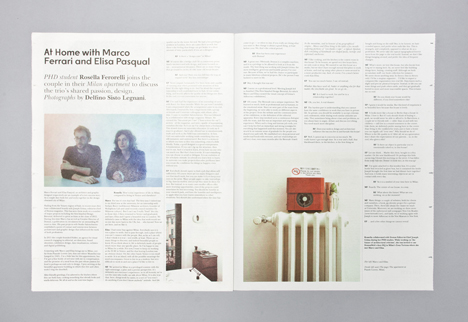
Dudson founded the magazine after a two-month paid internship with Domus in Milan and voluntary work with Boat magazine in London. "I gained a lot from my internships, but I had to sacrifice a lot in order to do them," he said.
Intern magazine has launched a funding campaign on Kickstarter this month, which runs until Wednesday 7 August 2013. If the fundraising is successful, issue one will go on sale in October 2013. Here's the campaign video:
Here's the full interview with Dudson:
Kate Andrews: Why did you decide to start Intern magazine?
Alec Dudson: I set out on my first internship in the magazine industry last March with Domus in Milan. After two months there, moved to London and worked for the remainder of the year with Boat. Realising after what were two wonderful, yet financially tough, experiences that I was no closer to my dream position with a magazine, I started to explore the possibilities of setting up my own. Inspired by my own relatively brief time in the world of internships and the experiences of others I had met, it struck me that the ideal subject for such an endeavour was right before my eyes.
I knew from my time at Boat how slender the opportunities to make a profit off print publications were, so any project I did set out on was going to need to undertaken by me alone, wherever possible. Fortunately, Chris, one of the freelance designers at Boat during my stint there, was just setting up design studio She Was Only with a couple of friends and they were prepared to take on the project's design and art direction. Without them, I would have struggled to get the idea off the ground.
Kate Andrews: Were your internships with Domus and Boat magazine paid or unpaid?
Alec Dudson: At Domus I was paid €400 a month, which just about covered my rent when I was out there. Boat was not but I approached them and was fully aware of the situation before I started.
Kate Andrews: When does the first issue come out?
Alec Dudson: Our Kickstarter campaign runs until August 7th. Should we successfully raise the £5500 or more, I hope to have issue one on sale in September or October at the latest. While a portion of our content is already down and good to go, my helpless desire for perfection and the difficulties in rounding up final drafts of all the articles will inevitably cause some delays. But I firmly intend for the magazine to be very much worth the wait. Anyone backing us to the tune of £1 or more will be kept in the loop regarding the issue's progress allowing our backers to come with us on the journey towards our launch.
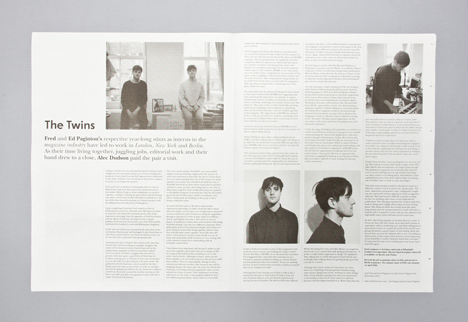
Kate Andrews: What will be in the first issue?
Alec Dudson: The first issue will feature a selection of work by interns from around the world alongside a balanced debate that also see contributions from those established in the creative industries.
Kate Andrews: What are your thoughts about internships, particularly unpaid internships, in the creative industries?
Alec Dudson: I don't necessarily feel that the creative industries are any better or worse than other industries with regard to how they treat and value unpaid and junior talent, but I do feel that they make a fascinating case study.
The danger across all industries is that a culture is fostered whereby young talent thinks nothing of working unpaid and puts up with arrangements that are far from beneficial. I personally feel I gained a lot from my internships but I had to sacrifice a lot in order to work them, still I am luckier than most as I was in a position where I could make the situation work. A great deal of people simply can't afford to work for free and by creating situations where only those who can afford are granted access to the industries, you engender a scenario where the pool of talent being picked from is already very selective. Surely this is a morally perplexing scenario for the creative industries as creativity isn't something only people of a certain social class have or can articulate?
Kate Andrews: What advice would you give to graduates hoping to enter the creative industries?
Alec Dudson: My advice to new talent would be to have the confidence to value yourself and your time. If you end up working unpaid for a studio or company whose work you adore, yet you aren't given the sort of hands on experience that you desire, or aren't made to feel an important part of the team, don't be afraid to walk away. Doing so in a civil manner won't stop you being able to list them on your CV and get a reference.
The best internships out there are those where trust is placed in the intern and they are allowed a degree of creative freedom and involvement in the day-to-day. It might not seem like it, but there are some great places out there that provide these sort of experiences, they pay as well. Confidence in your ability and the confidence to communicate that ability are key in breaking into the creative industries.
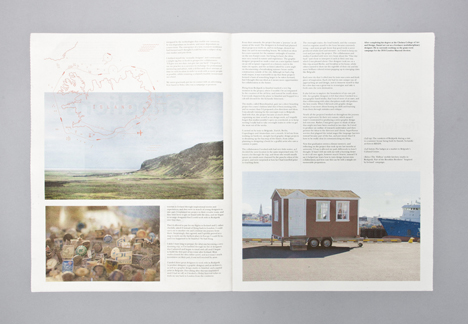
Kate Andrews: Do you think unpaid work is okay or not?
Alec Dudson: I think there remain situations where it can be beneficial. I certainly wouldn't have had the confidence or the know-how to approach [this project] if it had not been from my time with Boat magazine. Ideally, of course, all positions would be paid. But I think if those contemplating internships have a better idea of what to expect and what isn't acceptable when it comes to free work, then a lot of the exploitative unpaid positions can be eradicated.
Kate Andrews: Are internships a good thing?
Alec Dudson: Again, in their purest form, absolutely. A good internship is one where the transaction - in a non-monetary sense - is enriching for both parties. By treating interns as a valuable resource and a part of the team, employers can get far more than an eager worker in return. From the intern's perspective, someone who values their contribution and trusts them, offering guidance where needed can be of great value going forward. Of course these experiences are always subjective but there are too many instances where the arrangement offers little for the intern that little or no monetary compensation can justify.
Kate Andrews: Will Intern magazine be taking on interns? Will they be paid?
Alec Dudson: We won't be taking on interns. We will be sourcing contributions from interns and unpaid workers in the creative industries and paying them for their contribution. The reality is that this won't be a full professional rate, but as a new publication and one with a model for steady sustainable growth, we will pay as much as we can. It is the hope that as the magazine grows, sooner rather than later, those payments will reflect a professional rate.
Kate Andrews: What stance will the magazine take on unpaid internships?
Alec Dudson: Our position can't be overly vitriolic as it would undermine our ability to host a debate of any worth. However, it is clear enough from our stance on paying our contributors that we would welcome a move away from unpaid positions. Internships can be a positive thing to do. We will feature stories from those who we believe provide excellent internships but will not waste our time bad-mouthing those who don't. A key means of enriching the intern experience for all concerned is providing the tools - in terms of advice and tales of others' experience - that enable those applying for internships to be more discerning and that is one of the magazine's main intentions.
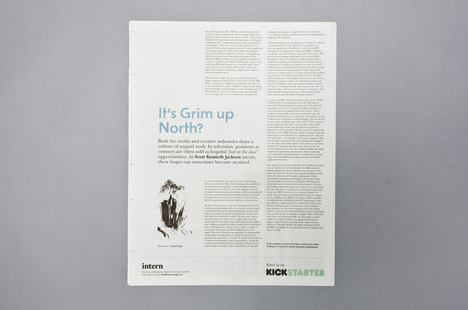
Kate Andrews: What are your thoughts on Sou Fujimoto's comments about unpaid architecture internships in Japan?
Alec Dudson: The RIBA's stance [in calling for people to report unpaid internships in the UK] is an important attempt to clean house of the UK architecture industry. The debate may not have much footing in Japan at the moment but it will be interesting to see if that remains the case going forward. If the interns are highly involved in model building and, with that, real projects, then I imagine it can be a really great experience for them, particularly with a firm with huge international status.
Where it gets morally perplexing is that realistically, few can afford to work for three to six months unpaid for 12 hours a day, 5 days a week. If this is during studies or with a scholarship in place then I imagine it is easier but it is those who have the talent yet are financially restricted from getting that experience that we should be worrying about and that the debate needs driving forward for.
Kate Andrews: What about Dick Powell's recent speech that advised people to "work for nothing" to break into the industry?
Alec Dudson: Unpaid positions can, in circumstances that satisfy the intern's needs, be useful experiences for those trying to break into the industry and I think that is what he is suggesting. But it is a bit disappointing that a prominent figure associated with a foundation like D&AD is encouraging graduates to specifically seek out unpaid work.